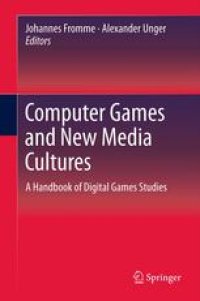
Ebook: Computer Games and New Media Cultures: A Handbook of Digital Games Studies
- Tags: Education (general), Social Sciences general, Personality and Social Psychology, Computers and Education
- Year: 2012
- Publisher: Springer Netherlands
- Edition: 1
- Language: English
- pdf
Digital gaming is today a significant economic phenomenon as well as being an intrinsic part of a convergent media culture in postmodern societies. Its ubiquity, as well as the sheer volume of hours young people spend gaming, should make it ripe for urgent academic enquiry, yet the subject was a research backwater until the turn of the millennium. Even today, as tens of millions of young people spend their waking hours manipulating avatars and gaming characters on computer screens, the subject is still treated with scepticism in some academic circles. This handbook aims to reflect the relevance and value of studying digital games, now the subject of a growing number of studies, surveys, conferences and publications.
As an overview of the current state of research into digital gaming, the 42 papers included in this handbook focus on the social and cultural relevance of gaming. In doing so, they provide an alternative perspective to one-dimensional studies of gaming, whose agendas do not include cultural factors. The contributions, which range from theoretical approaches to empirical studies, cover various topics including analyses of games themselves, the player-game interaction, and the social context of gaming. In addition, the educational aspects of games and gaming are treated in a discrete section. With material on non-commercial gaming trends such as ‘modding’, and a multinational group of authors from eleven nations, the handbook is a vital publication demonstrating that new media cultures are far more complex and diverse than commonly assumed in a debate dominated by concerns over violent content.
Digital gaming is today a significant economic phenomenon as well as being an intrinsic part of a convergent media culture in postmodern societies. Its ubiquity, as well as the sheer volume of hours young people spend gaming, should make it ripe for urgent academic enquiry, yet the subject was a research backwater until the turn of the millennium. Even today, as tens of millions of young people spend their waking hours manipulating avatars and gaming characters on computer screens, the subject is still treated with scepticism in some academic circles. This handbook aims to reflect the relevance and value of studying digital games, now the subject of a growing number of studies, surveys, conferences and publications.
As an overview of the current state of research into digital gaming, the 42 papers included in this handbook focus on the social and cultural relevance of gaming. In doing so, they provide an alternative perspective to one-dimensional studies of gaming, whose agendas do not include cultural factors. The contributions, which range from theoretical approaches to empirical studies, cover various topics including analyses of games themselves, the player-game interaction, and the social context of gaming. In addition, the educational aspects of games and gaming are treated in a discrete section. With material on non-commercial gaming trends such as ‘modding’, and a multinational group of authors from eleven nations, the handbook is a vital publication demonstrating that new media cultures are far more complex and diverse than commonly assumed in a debate dominated by concerns over violent content.
Digital gaming is today a significant economic phenomenon as well as being an intrinsic part of a convergent media culture in postmodern societies. Its ubiquity, as well as the sheer volume of hours young people spend gaming, should make it ripe for urgent academic enquiry, yet the subject was a research backwater until the turn of the millennium. Even today, as tens of millions of young people spend their waking hours manipulating avatars and gaming characters on computer screens, the subject is still treated with scepticism in some academic circles. This handbook aims to reflect the relevance and value of studying digital games, now the subject of a growing number of studies, surveys, conferences and publications.
As an overview of the current state of research into digital gaming, the 42 papers included in this handbook focus on the social and cultural relevance of gaming. In doing so, they provide an alternative perspective to one-dimensional studies of gaming, whose agendas do not include cultural factors. The contributions, which range from theoretical approaches to empirical studies, cover various topics including analyses of games themselves, the player-game interaction, and the social context of gaming. In addition, the educational aspects of games and gaming are treated in a discrete section. With material on non-commercial gaming trends such as ‘modding’, and a multinational group of authors from eleven nations, the handbook is a vital publication demonstrating that new media cultures are far more complex and diverse than commonly assumed in a debate dominated by concerns over violent content.
Content:
Front Matter....Pages i-viii
Computer Games and Digital Game Cultures: An Introduction....Pages 1-28
Front Matter....Pages 29-29
The Mediality of Computer Games....Pages 31-46
Computer Games as a Comparative Medium: A Few Cautionary Remarks....Pages 47-59
“And What Do You Play?”: A Few Considerations Concerning a Genre Theory of Games....Pages 61-74
Interface Analysis: Notes on the “Scopic Regime” of Strategic Action in Real-Time Strategy Games....Pages 75-91
Computer Games as Works of Art....Pages 93-106
A Theory of Non-existent Video Games: Semiotic and Video Game Theory....Pages 107-124
Free Market Economy and Dino Crisis: The Production and Circulation of Knowledge in Strategy Games....Pages 125-142
The Strange Case of the Misappearance of Sex in Video Games....Pages 143-160
Growing Game Worlds....Pages 161-172
Virtual Worlds: Game or Virtual Society?....Pages 173-190
Front Matter....Pages 191-191
MMO Morality....Pages 193-208
Inside and Outside the Game....Pages 209-217
Egoshooting in Chernobyl: Identity and Subject(s) in the S.T.A.L.K.E.R. Games....Pages 219-231
Personality Development Through Immersion into Intermediate Areas of Digital Role-Playing Games....Pages 233-247
Symbolic Interaction in Digital Games: Theoretical Reflections on Dimensions of Meaning Construction in Digital Gameplay....Pages 249-263
Playing by the Visual Rules: An Ecological Approach to Perception and Video Games....Pages 265-278
The Effect of Authentic Input Devices on Computer Game Immersion....Pages 279-292
Front Matter....Pages 293-293
Digital Games in the Context of Adolescent Media Behavior....Pages 295-315
Online Games: Modern Media Worlds of Young People....Pages 317-328
Front Matter....Pages 293-293
Playing Together: The Player’s Repertoire, an Obstacle to Learning....Pages 329-342
The Right Game: Video Game Choice of Children and Adolescents....Pages 343-356
The Challenge of Measuring the Use of Computer Games....Pages 357-369
A Critical Interpretation of a New “Creative Industry” in Turkey: Game Studios and the Production of a Value Chain....Pages 371-391
Front Matter....Pages 393-393
Mergence of Spaces: MMORPG User-Practice and Everyday Life....Pages 395-409
Interpretation, Conflict and Instruction in Online Multiplayer Games: Lessons from Warsong Gulch....Pages 411-424
‘Pity There’s So Few Girls!’ Attitudes to Female Participation in a Swedish Gaming Context....Pages 425-441
The Gender-Offensive: Female Gaming Cultures Between Shooters and Marketing....Pages 443-463
Playing Computer Games as Social Interaction: An Analysis of LAN Parties....Pages 465-476
Playing Computer Games as Electronic Sport: In Search of a Theoretical Framework for a New Research Field....Pages 477-490
Machinima Filmmaking as Culture in Practice: Dialogical Processes of Remix....Pages 491-507
Modding as Part of Game Culture....Pages 509-523
Digital Game Culture(s) as Prototype(s) of Mediatization and Commercialization of Society: The World Cyber Games 2008 in Cologne as an Example....Pages 525-540
Front Matter....Pages 541-541
Social Interactions in Virtual Worlds: Patterns and Profiles of Tween Relationship Play....Pages 543-555
Learning Through Play – A Delicate Matter: Experience-Based Recursive Learning in Computer Games....Pages 557-569
Learning Instruments: Baroque Music Gets Game....Pages 571-584
Using Simulations as a Starting Point for Constructing Meaningful Learning Games....Pages 585-602
School-Related Computer Game Pedagogy: Core Subjects and Tasks....Pages 603-617
Learning to Play: Video Game Literacy in the Classroom....Pages 619-632
Front Matter....Pages 633-646
Digital Games and Media Education in the Classroom: Exploring Concepts, Practices, and Constraints....Pages 541-541
Why a Game Canon for Game Studies Education Is Wrong....Pages 647-663
Back Matter....Pages 665-677
....Pages 679-710













